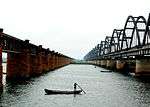Wardha district
| Wardha district वर्धा जिल्हा | |
|---|---|
| District of Maharashtra | |
 Location of Wardha district in Maharashtra | |
| Country | India |
| State | Maharashtra |
| Administrative division | Nagpur Division |
| Headquarters | Wardha |
| Tehsils | 1. Wardha, 2. Deoli, 3. Seloo, 4. Arvi 5. Ashti 6. Karanja 7. Hinganghat, 8. Samudrapur. |
| Government | |
| • Lok Sabha constituencies | Wardha (Lok Sabha constituency) |
| • Assembly seats | Wardha, Deoli, Arvi, Hinganghat |
| Area | |
| • Total | 6,310 km2 (2,440 sq mi) |
| Population (2011) | |
| • Total | 1,300,774 |
| • Density | 210/km2 (530/sq mi) |
| Demographics | |
| • Literacy | 78.37% |
| • Sex ratio | 946:1000 (Female:Male) |
| Major highways | NH7 |
| Average annual precipitation | 1062.8 mm |
| Website | Official website |
Wardha district (Marathi: वर्धा जिल्हा) is one of the 36 districts in the state of Maharashtra in western India. This district is a part of Nagpur Division. The city of Wardha is the administrative headquarters of the district. The district had a population of 1,300,774, of which 26.28% were urban as of 2011. The legal drinking age in the Wardha district is 30 years old, making it the highest legal drinking age in the world.[1]
History
The History of the Wardha district dates back to ancient times. It has a unique place in Indian Natural History, since the Ostrich egg-shell has been found at Sindi (Railway) in Wardha district. It was included in the empire of Mauryas, Shungas, Satavahanas and Vakatakas. Pravarpur, now modern-day Pavnar, was once the capital of the Vakataka dynasty. Vakatakas were contemporaries of the Imperial Guptas. The daughter of Chandragupta II, Prabhavatigupta, was married to the Vakataka ruler Rudrasena II. The Vakataka Dynasty lasted from the 2nd to 5th centuries AD. Their state stretched from the Arabian Sea in the west to the Bay of Bengal in the east and from the Narmada River in the north to the Krishna-Godavari Delta in the south.
Later on, Wardha was ruled by Chalukyas, Rashtrakutas, Yadavas, Delhi Sultanate, Bahamani Sultanate, Muslim ruler of Berar, Gonds and Maratha. Raja Buland Shaha of Gonds, Raghuji of Bhonsale were the prominent rulers in Medieval period. Nearby 1850s Wardha, (then a part of Nagpur) fell into the hands of British. They included Wardha in the Central Provenance. Wardha is a sister city for Sevagram, and both were used as major centers for the Indian Independence Movement, especially as headquarters for an annual meet of the Indian National Congress in 1934, and Mahatma Gandhi's Ashram.
The existing Wardha district was part of Nagpur district till 1862. Further it was separated for convenient administrative purpose and Kawatha near Pulgaon was the district headquarters. In the year 1866, the district headquarters moved at Palakwadi village which is the existing place and then Wardha city was developed there. In Wardha there is one village called Pavanar where Acharya Vinoba Bhave lived.
Recently this district has been in news because of a number of suicides that have been committed by the farmers owing to the agricultural loans they can not repay, with the major reasons being bad crops, droughts and lack of irrigation facilities in the region. The Prime Minister of India Dr. Manmohan Singh visited this district, review the situation and announced the economic help package for farmers.
Demographics
According to the 2011 census, Wardha district has a population of 1,300,774,[2] roughly equal to the nation of Mauritius[3] or the US state of New Hampshire.[4] This gives it a ranking of 377th in India (out of a total of 640).[2] The district has a population density of 205 inhabitants per square kilometre (530/sq mi) .[2] Its population growth rate over the decade 2001-2011 was 4.8%.[2] Wardha has a sex ratio of 946 females for every 1000 males,[2] and a literacy rate of 87.22%.[2]
Centre and State Representative
Lok Sabha Seat
- Wardha = Ramdas Tadas (BJP)
Maharashtra Legislative Assembly Seats
- Wardha = Dr. Pankaj Rajesh Bhoyar (BJP)
- Deoli = Ranjit Kamble (INC)
- Arvi = Amar Kale (INC)
- Hinganghat = Samir Trambakrao Kunawar (BJP)
Prominent people
- Baba Amte, India's Social and moral leader (born 24 December 1914 ) at Hinganghat
- Jamnalal Bajaj, Freedom Fighter
- Abhay Bang Rani Bang, Social Workers, rendering medical services to the poor adiwasi people of Gadchiroli district.
- Abhay Mahalley, [Member of EAISI-NEW DELHI]
References
- ↑ http://drinkingage.procon.org/view.resource.php?resourceID=004294
- 1 2 3 4 5 6 "District Census 2011". Census2011.co.in. 2011. Retrieved 2011-09-30.
- ↑ US Directorate of Intelligence. "Country Comparison:Population". Retrieved 2011-10-01.
Mauritius 1,303,717 July 2011 est.
- ↑ "2010 Resident Population Data". U. S. Census Bureau. Retrieved 2011-09-30.
New Hampshire 1,316,470
External links
Coordinates: 20°50′N 78°36′E / 20.833°N 78.600°E



